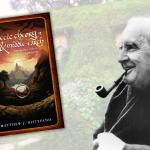A big Thank You to Daniel Florien of Unreasonable Faith.com for listing this blog as one of his Top 30 Atheist/Agnostic/Skeptic Blogs.
It sounds like an awards-show cliché, but it's an honor to be included in such a distinguished list. I'd second Florien's pick for the top spot. PZ Myers would come in at No. 1 on my attempt at such a list too, as well as No. 1 on a list of, say, "Blogs I Hope My Daughters' Science Teachers Read." The rest of Florien's list is worth your browsing and bookmarking time as well — featuring lots of good writers, good thinkers and those enviable show-offs who are both.
This blog is probably the unlikeliest on that Top 30 list. I'm neither an atheist nor an agnostic, but a Christian, a Baptist in the evangelical tradition. But I'm also not the only person posting here on a semi-regular basis. The compliment of being included in this list results, I think, from the humor and insights and give-and-take that one can find here in the comments section, where atheists, agnostics and skeptics of every sort regularly rub elbows with (and sometimes jab elbows at) a glorious mix of believers of every sort. That jostling mix is, in its own small way, a model of the robust pluralism that I think is an essential part of the American ideal.*
The goal of such robust pluralism isn't to seek or to suggest some ultimate harmony in these disparate views, but rather to highlight the dissonance. Like most humans, I'm bound to be wrong about many things, and the things I'm likeliest to be wrong about are those things I'm least aware I might be wrong about. So it seems not just prudent, but necessary, to engage as many disparate views as possible.
Daniel Taylor is quite good on this point in his helpful book The Myth of Certainty: The Reflective Christian & the Risk of Commitment. There are some awkward bits in this book where I'm not sure Taylor summarizes other viewpoints in quite the way that those who hold those views might, and his category of "the reflective Christian" can sometimes seem a bit self-congratulatory, but on that last part of his subtitle — "The Risk of Commitment" — the book is excellent.
I reviewed Taylor's book years ago for Prism magazine in tandem with a review of Nick Hornby's novel High Fidelity (also highly recommended, as is John Cusack's film adaptation). Like many of Hornby's stories, High Fidelity recounts the story of a man-child. Rob Gordon's life is a kind of extended adolescence because he's waiting for certainty before being willing to risk commitment. This can seem like only so much pop-psychology when applied to romantic comedy, but it's a nice metaphor for what Taylor is getting at. Certainty is not a human prerogative, but commitment is a human necessity. That leaves us all in an uncomfortable position.
If all certainty is illusory, including the certainty of disillusionment, then we're all in the same boat. We're all forced to take the risk of commitment without the comforting-but-false promise of what Taylor calls "safety through certainty."
This is what I admire most about the commendable skeptics on Florien's list. It's not just that many of these folks are smart or sharp or witty, it's that they have the courage to risk commitment. A list of Top Skeptical blogs is worth your time in a way that a list of Top Cynical blogs could never be.
– – – – – – – – – – – –
* I'm sure at some point you've played that game where you're asked to come up with your dream dinner party of figures from history. We were playing an Americans-only variation, and I'd just started on my list — Franklin, Lincoln, Twain, Eleanor Roosevelet, Calista Vinton,** Dr. King … — when a friend suggested that I shouldn't seat Twain and King next to each other as they might get into an argument about religion. All I could think was that I'd have paid anything to hear that argument.
** Early 19th-century Baptist missionary who traveled to Burma with her husband. She was a controversial figure at the time due to her insistence that God had called her to preach. That didn't go over well with some of her fellow Baptists who believed that women were meant to keep silent. She didn't respond with an argument defending the legitimacy of her calling. She responded by preaching. And by all accounts, no one who heard her dared press the point any further.
















